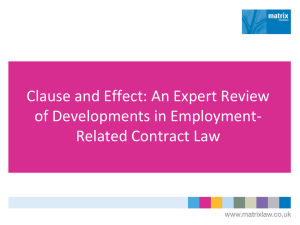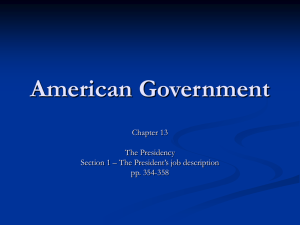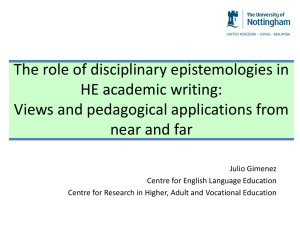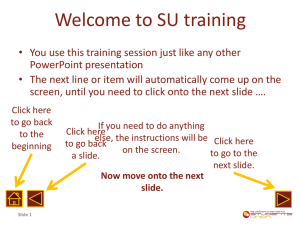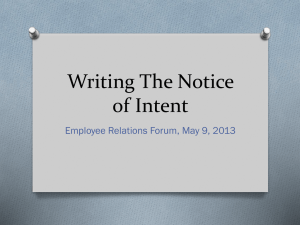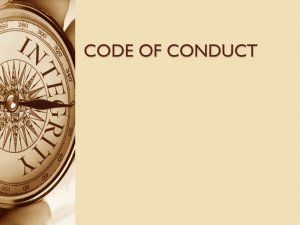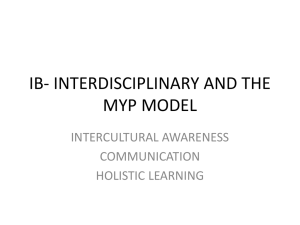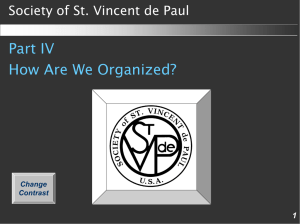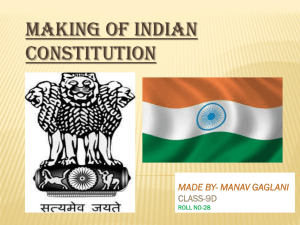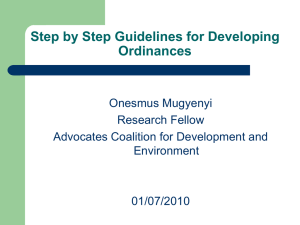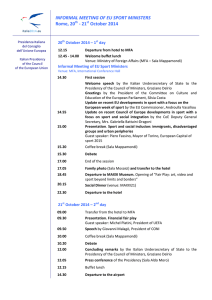Lesson 107 D&C 102 The High Council Power Pt
advertisement
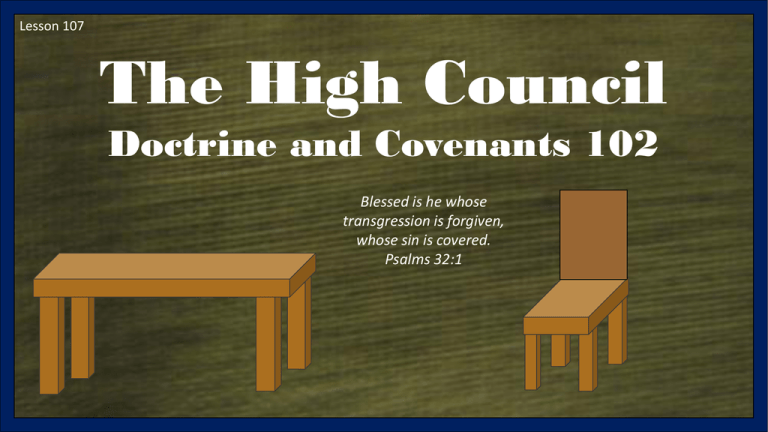
Lesson 107 The High Council Doctrine and Covenants 102 Blessed is he whose transgression is forgiven, whose sin is covered. Psalms 32:1 Background By January 1834 the Church had grown to over 3,000 members. This growth created a need for additional leadership to manage the affairs of the Church. On February 17, 1834, twenty-four high priests gathered in Joseph Smith’s home for a conference in which the first high council of the Church was organized. Orson Hyde, the clerk of the meeting, noted that the high council may have made some errors in the minutes of the meeting. Therefore, the council voted that the Prophet should make any necessary corrections. Joseph Smith spent the next day, February 18, making an inspired revision of those initial minutes. The minutes were amended and accepted the following day, February 19. Now found in Doctrine and Covenants 102, these minutes outline the establishment of high councils and provide direction for stake presidencies and high councils when they administer discipline for people who have committed serious transgressions. (Note that district presidencies and district councils may also be authorized to follow these procedures.) “Some years ago … I served as a stake president. We had a very grievous case that had to come before the high council and the stake presidency that resulted in the excommunication of a man who had harmed a lovely young girl. After a nearly all-night session that resulted in that action, I went to my office rather weary the next morning and was confronted by a brother of this man whom we [met with in council] the night before. This man said, ‘I want to tell you that my brother wasn’t guilty of what you charged him with.’ “‘How do you know he wasn’t guilty?’ I asked. “‘Because I prayed, and the Lord told me he was innocent,’ the man answered.” President Harold B. Lee In your opinion, how could the man have received an answer contrary to the decision made by the stake presidency and high council? Anciently-- Order of Heaven Jerusalem was the seat of the Church Council Peter was appointed by the voice of the Savior Peter was the president of the Council and held the keys to the Kingdom of God on the earth D&C 102:1 “It was not the order of heaven in ancient councils to plead for and against the guilty as in our judicial courts (so called) but that every councilor when he arose to speak, should speak precisely according to evidence and according to the teaching of the Spirit of the Lord, that no councilor should attempt to screen the guilty when his guilt was manifest. That the person accused before the High Council had a right to one half the members of the council to plead his cause, in order that his case might be fairly presented before the president that a decision might be rendered according to truth and righteousness. Kirtland Council Minute Book (24-25) A High Council A group of 12 high priests presided over by “one or three presidents.” In the Church today, a stake president and his counselors preside over a high council. Kirtland Days: It had general jurisdiction in Kirtland, Ohio, and the surrounding areas and was presided over by the First Presidency. However, as Church membership increased, stakes were organized and stake presidencies and high councils were called to administer the Church within their individual stake boundaries. First High Priest Quorum 1898 D&C 102:1 Necessity of Prayer “that the Spirit might be given, that the things of the Spirit might be judged thereby, because the carnal mind cannot discern the things of God.” “The minutes were read three times, and unanimously adopted and received for a form and constitution of the High Council of the Church of Christ hereafter; with this provision, that if the President should hereafter discover anything lacking in the same, he should be privileged to supply it.” Prophet Joseph Smith D&C 102:1 Being Prepared To Sit On A Council “Our acts are recorded, and at a future day they will be laid before us, and if we should fail to judge right and injure our fellow-beings, they may there, perhaps, condemn us; there they are of great consequence, and to me the consequence appears to be of force, beyond anything which I am able to express. “Ask yourselves, brethren, how much you have exercised yourselves in prayer since you heard of this council; and if you are now prepared to sit in council upon the soul of your brother.” D&C 102:1 Prophet Joseph Smith Purpose of High Council “The most serious transgressions, such as serious violations of civil law, spouse abuse, child abuse, adultery, fornication, rape, and incest, often require formal Church discipline. A high council is appointed by revelation to settle important difficulties that arise in the Church. D&C 102:2 President Harold B. Lee Formal Church discipline may include restriction of Church membership privileges or loss of Church membership. … The Council—Voice of the Council Presidents Sidney Rigdon Joseph Smith, Jun Frederick G. Williams There were 43 men attending a meeting at Joseph Smith’s home on February 17, 1833 High Priest— Standing council for the Church D&C 102:2, 5 True to the Faith Joseph Smith, Sen John Smith Joseph Coe John Johnson Martin Harris John S. Carter Jared Carter Oliver Cowdery Samuel H. Smith Orson Hyde Sylvester Smith Luke Johnson Standing Council The First Presidency served as the stake presidency of a standing high council— having authority in a specified area Later on July 7, 1834 the Prophet organized a second high council in Clay-county, Missouri—a traveling council William W. Phelps David Whitmer John Whitmer These were not confined to the boundaries Today we call them General Authorities or General Officers of the Church D&C 102:3 McConkie and Ostler The Disciplinary Council The high council has no authority to act unless 7 of the 12 members are present If some members of a stake high council could not attend a church disciplinary council, other worthy high priests could be invited to substitute for them. Today—all high councils are presided over by the president of their respective stakes Counselors to a president may preside in the absence of the president if they have been directed to do so by the president. Counselors have no authority independent of the president. When the president is released they are also released D&C 102:6-11 McConkie and Ostler Lots Drawn The members of the High Council drew lots 2,4,6,8,10,12 Obligation to look after the interests of the one for whom the council is being held D&C 102:12-17 McConkie and Ostler All unite as one to determine truth and establish right or justice 1,3,5,7,9,11 Obligation to look after the interests of the Church To Defend Oneself “That the council should try no case without both parties being present, or having had an opportunity to present; neither should they hear one persons complaint before his case is brought up for trial; neither should they suffer the character of any one to be exposed before the High council without the person being present and ready to defend him or herself; that the minds of the councilors be not prejudiced for or against any one whose case they may possibly have to act upon.” HC If a party or essential witness is unable to attend a disciplinary council, the presiding officer invites him to submit a written statement D&C 102:18 Courts of Love “Priesthood courts are not courts of retribution. They are courts of love.” “…The adversary places a fear in the heart of the transgressor that make it so difficult for him to do what needs to be done; Doing what needs to be done will never be easier than right now… There are no shortcuts.” Robert I Simpson “As the time of repentance is procrastinated, the ability to repent grows weaker, neglect of opportunity in holy things develops inability.” James E. Talmage The Decision “The principles here stated, if followed, will assure that what is right and proper and in the best interest of both the accused and the church will be made manifest. “The decision of every disciplinary council should be sustained by the Spirit of revelation. It is customary in such councils for the presiding officers of the council to retire for prayer, in which they seek the confirmation of heaven on their decision.” Church disciplinary councils do not center on an effort to define points of law but rather in a quest for the direction of the Spirit to assure the preservation of justice and truth.” D&C 102:19-23 McConkie and Ostler “No man is capable of judging a matter, in council, unless his own heart is pure; and … we are frequently so filled with prejudice, or have a beam in our own eye, that we are not capable of passing right decisions.” HC “I wish to assure you … that I think there is never a judgment rendered until after prayer has been had. Action against a member is too serious a matter to result from the judgment of men alone, and particularly of one man alone. There must be the guidance of the Spirit, earnestly sought for and then followed, if there is to be justice” President Gordon B. Hinckley D&C 102:19-23 McConkie and Ostler The Lord reveals His mind to those who preside over disciplinary councils D&C 102:23 Records and Appeals The stake president assigns a clerk to summarize stake disciplinary council proceedings. Following approval by the stake president, the report is forwarded to the First Presidency. Any person disfellowshipped or excommunicated in a Church disciplinary council has the right to appeal the decision to higher councils. Who would you have more confidence in— the stake presidency and high council or the man who challenged their decision? D&C 102:26-27 Student Manual The decision of a bishop’s disciplinary council may be appealed to the stake disciplinary council, and the decision of a stake disciplinary council may be appealed to the First Presidency. The Rest of the Story… “I asked him to come into the office and we sat down, and I asked, ‘Would you mind if I ask you a few personal questions?’ “He said, ‘Certainly not.’ … “‘How old are you?’ “‘Forty-seven.’ Harold B. Lee “‘What priesthood do you hold?’ “He said he thought he was a teacher. “‘Do you keep the Word of Wisdom?’ “‘Well, no.’ … “‘Do you pay your tithing?’ “He said, ‘No’—and he didn’t intend to as long as that … man was the bishop of the Thirty-Second Ward. “I said, ‘Do you attend your priesthood meetings?’ “He replied, ‘No, sir!’ … Harold B. Lee “‘Do you have your family prayers?’ and he said no. “‘Do you study the scriptures?’ He said well, his eyes were bad, and he couldn’t read very much. … “Then this man gave an answer that I think was a classic. He said, ‘Well, President Lee, I think I must have gotten my answer from the wrong source’” “‘Now, then,’ I said, ‘fifteen of the bestliving men in the Pioneer Stake prayed last night. … and every man was united. … Now you, who do none of these things, you say you prayed and got an opposite answer. How would you explain that?’ To Return When members need to have certain blessings withheld, the Lord’s object is to teach as well as to discipline. So probation, disfellowshipment, and excommunication, when they become necessary, are ideally accompanied by eventual reinstatement and restoration of blessings. Elder M. Russell Ballard Church discipline is an inspired process that takes place over a period of time. Through this process and through the Atonement of Jesus Christ, a member can receive forgiveness of sins, regain peace of mind, and gain strength to avoid transgression. Church discipline is designed to help Heavenly Father's children in their efforts to be purified from sin through the Atonement, return to full fellowship in the Church, and receive the full blessings of the Church. Church Disciplinary Councils Sources: Suggested Hymn: #4 Truth Eternal Videos: The Church is Governed through Councils (1:05) Disciplinary Councils (0:56) President Harold B. Lee (Teachings of Harold B. Lee, ed. Clyde J. Williams [1996], 420–21). Prophet Joseph Smith (History of the Church, 2:31.) (History of the Church, 2:25-26; 4:154 (True to the Faith: A Gospel Reference [2004], 37–38). Joseph Fielding McConkie and Craig J. Ostler Revelations of the Restoration pg. 745-746 Robert I. Simpson April 1972 Conf. Report p. 32 James E. Talmage Articles of Faith pg. 114 President Gordon B. Hinckley In … Counsellors There Is Safety, Ensign, Nov. 1990, 50 Doctrine and Covenants Student Manual Religion 324-325 Section 102 Elder M. Russell Ballard A Chance to Start Over: Church Disciplinary Councils and the Restoration of Blessings Sept. 1990 Ensign Elder M. Russell Ballard of the Quorum of the Twelve Apostles explained the following about Church disciplinary councils: “Members sometimes ask why Church disciplinary councils are held. The purpose is threefold: to save the soul of the transgressor, to protect the innocent, and to safeguard the Church’s purity, integrity, and good name. “The First Presidency has instructed that disciplinary councils mustbe held in cases of murder, incest, [child abuse (sexual or physical),] or apostasy. A disciplinary council must also be held when a prominent Church leader commits a serious transgression, when the transgressor is a predator who may be a threat to other persons, when the person shows a pattern of repeated serious transgressions, [and] when a serious transgression is widely known. … “Disciplinary councils may also be convened to consider a member’s standing in the Church following serious transgression such as abortion, transsexual operation, attempted murder, rape, forcible sexual abuse, intentionally inflicting serious physical injuries on others, adultery, fornication, homosexual relations, … spouse abuse, deliberate abandonment of family responsibilities, robbery, burglary, embezzlement, theft, sale of illegal drugs, fraud, perjury, or false swearing. [A disciplinary council may also be convened when a transgressor is guilty of serious deceptive practices, false representations, or other forms of fraud or dishonesty in business transactions.] “Disciplinary councils are not called to try civil or criminal cases. The decision of a civil court may help determine whether a Church disciplinary council should be convened. However, a civil court’s decision does not dictate the decision of a disciplinary council. “Disciplinary councils are not held for such things as failure to pay tithing, to obey the Word of Wisdom, to attend church, or to receive home teachers. They are not held because of business failure or nonpayment of debts. They are not designed to settle disputes among members. Nor are they held for members who demand that their names be removed from Church records or [become less active]. … “A disciplinary council begins with an opening prayer, followed by a statement of the reason for the council being convened. The member is asked to tell in simple and general terms about the transgression and to explain his or her feelings and what steps of repentance he or she has taken. The member may respond to clarifying questions from the leaders. Then he or she is excused, and the leaders counsel together, pray, and reach a decision. “The council takes into consideration many factors, such as whether temple or marriage covenants have been violated; whether a position of trust or authority has been abused; the repetition, seriousness, and magnitude of the transgression; the age, maturity, and experience of the transgressor; the interests of innocent victims and innocent family members; the time between transgression and confession; whether or not confession was voluntary; and evidence of repentance. “Those who sit on the council are to keep everything strictly confidential and to handle the matter in a spirit of love. Their objective is not retribution; rather, it is to help the member make the changes necessary to stand clean before God once more. “Decisions of the council are to be made with inspiration. A council can reach one of four decisions: (1) no action, (2) formal probation, (3) disfellowshipment, or (4) excommunication. “Even if a transgression has been committed, the council may decide to take no action at that time. (The member would be encouraged to receive further counsel from his or her bishop.) “Formal probation is a temporary state of discipline, imposed as a means to help the member fully repent. The presiding officer of the council specifies the conditions under which the probation can be terminated. During the probation, the bishop or stake president keeps in close contact to help the individual progress. “The third decision the council may take is to disfellowship the member. Disfellowshipment is [meant to be] temporary, though not necessarily brief. Disfellowshipped persons retain membership in the Church. They are encouraged to attend public Church meetings, but are not entitled to offer public prayers or to give talks. They may not hold a Church position, take the sacrament, vote in the sustaining of Church officers, hold a temple recommend, or exercise the priesthood. They may, however, pay tithes and offerings and continue to wear temple garments if endowed. “Excommunication is the most severe judgment a Church disciplinary council can take. Excommunicated persons are no longer members of the Church. Therefore, they are denied the privileges of Church membership, including the wearing of temple garments and the payment of tithes and offerings. They may attend public Church meetings, but, like disfellowshipped persons, their participation in such meetings is limited. Excommunicated persons are encouraged to repent and so live as to qualify for eventual baptism” (“A Chance to Start Over: Church Disciplinary Councils and the Restoration of Blessings,” Ensign, Sept. 1990, 15–16). The Prophet Joseph Smith taught: “No standing High Council has authority to go into the churches abroad, and regulate the matters thereof, for this belongs to the Twelve. No standing High Council will ever be established only in Zion, or one of her stakes.” (History of the Church, 2:220.) Later he added: “The High Council had nothing to do with the Twelve, or the decisions of the Twelve. But if the Twelve erred they were accountable only to the General Council of the authorities of the whole Church, according to the revelations.” (History of the Church, 2:285.) The role of the high council is to assist the presidency in a stake, and the high council fulfills assignments as directed by the stake presidency. In an article on the Melchizedek Priesthood, the function of high councilors was discussed more fully: “High councilors play a vital role in the administration of the stake. Figuratively speaking, they constitute the right arm of the stake presidency. The degree to which they are faithful, efficient, and willing to work determines their value to the stake presidency and goes far in determining the progress made by the stake and ward organizations in which they have been called to serve. “The duties and assignments of high councilors are very extensive and varied. Such assignments absorb much time in stakes where the stake presidencies fully utilize their high councilors in carrying forward the Church program. Experience has shown that it is wisdom for stake presidencies to make very extensive use of their high councilors, because the progress of the work of the Lord within a stake and the efficiency with which it is carried forward will be determined to a large extent by the use made of high councilors by the stake presidency.” (“Melchizedek Priesthood: Responsibilities of High Councilors,” Improvement Era, Feb. 1954, p. 112.) Informal discipline: When a bishop learns of a transgression, usually through the confession of the member involved, he first counsels with the member. When the sin is not grievous, the bishop may decide, through inspiration, that no disciplinary action is needed. He may continue to give counsel and caution, helping the member resist temptation and avoid further transgression. Another option the bishop has is to place the member on informal probation, temporarily restricting his privileges as a Church member—such as the right to partake of the sacrament, hold a Church position, or enter the temple. The bishop may ask the member to surrender his temple recommend temporarily. In addition, he may require the member to make specific positive changes in attitude or behavior. No official record is made or kept of informal probation. The bishop maintains close contact with the member and may terminate the probation period when he is prompted to do so. In these cases, informal Church discipline may negate the need for formal disciplinary action. Since repentance and reformation are the primary objectives of any Church disciplinary action, the bishop may feel that the person has done or is doing everything necessary to repent and that a disciplinary council would serve no useful purpose. See the full article: Elder M. Russell Ballard A Chance to Start Over: Church Disciplinary Councils and the Restoration of Blessings September 1990 Ensign

